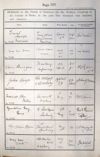FREDERICK JOHN ISLES
SAD DEATH OF A SOLDIER’S SON
On Wednesday afternoon, Mr. S. V. Pinniger, deputy coroner for the borough, conducted an inquest on the body of Frederick John Isles, which had been found in the water at the Electric Light Works that morning, after his disappearance on the Saturday before Easter. The lad, who was nine years old, was the son of Lance-Corporal L. B. Isles, now home on leave, of the 1st Royal Berks, and it appears that on the afternoon of April 22nd he was sent by his mother into the town from his home in Andover Road, on several errands, and being joined by another boy, they went to West Mills, where they played by the swing bridge. Isles told the other boy he was going to wait for his uncle, and his companion then left him. It was after this that the boy, by some unexplained means, got into the water, and in spite of strenuous search by the use of drags by the police, no trace of him could be found until Wednesday morning, when the body was recovered from the grating across the stream at Greenham Mills, occupied by the Electric Light Works.
At the inquest Mrs Isles said she did not worry about the boy’s non-return, thinking he had stayed to tea at his aunt’s, which was one of the places at which he had to call. A neighbour told her in the evening that a boy had been drowned, and she at once acquainted the police that her son was missing. Sidney John Smith, a schoolfellow of the deceased, gave evidence.
Mr. E. C. Lowe, of Messrs. Wallis and Lowe, of the Town Mills, said he was in the garden close to the stream on Saturday afternoon, shortly before five o’clock, when he heard a splash, and saw something floating by, which at a quick glance showed the arm and head of a child. He ran into the mill to put down the hatch and stop the current, but while he was doing this his wife told him that the boy had gone through. He telephoned at once to the police. The stream was flowing very swiftly, and the depth at the centre was eight or nine feet. There was a grating in front of the three wheels, but he did not think it feasible to put one across the stream, because it would become blocked by weeds and obstruct the waterway.
A juryman strongly advised that a grating should be provided, mentioning that at Hungerford Mill, where there was a much greater volume of water, a grating was kept clear. Children were constantly playing on the river bank, and if carried into this fast stream there was no chance of saving life. Intervening, the father said he felt sure the boy was alive before he passed through the mill, and if anyone had jumped in the force of the stream would have kept him afloat, and the child might have been saved. Evidence having been given of the recovery of the body from the water, the jury returned a verdict of “Accidentally drowned,” at the same time expressing a strong feeling that steps should be taken to prevent such accidents, by the provision of a grating across the head of the mill race. They also expressed their sincere sympathy with the parents, in which the coroner joined, and handed their fees to them. |



